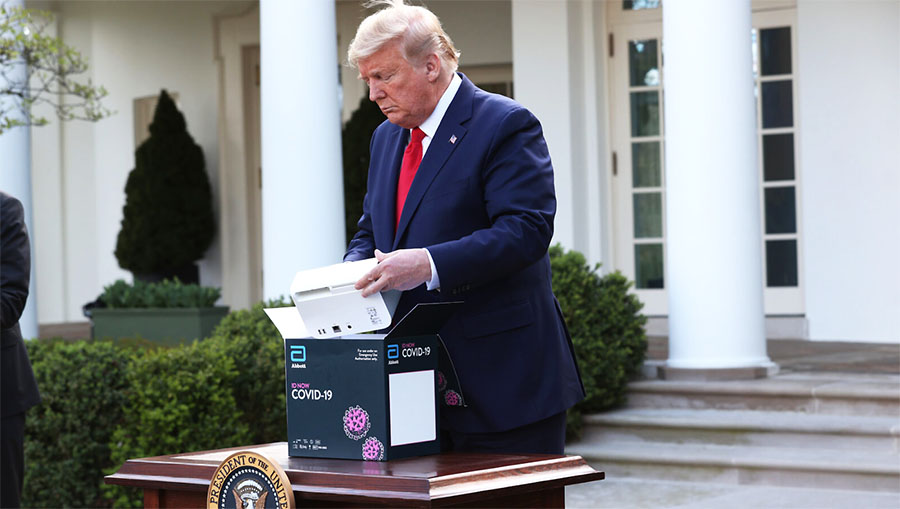By Eric Smith
<span style="color: #999999;">The U.S. economy needs a jumpstart after being ravaged by the coronavirus for the last month, and the latest data points speak to just how dire the situation has become.
This week saw the unemployment total hit another record, with 22 million claims to date, driven in part by the devastating yet completed expected news of a coronavirus-driven wasteland formerly known as retail.
As we reported earlier this week, retail sales in the U.S. plummeted 8.7 percent to $483.1 billion in March from the previous month, according to the Department of Commerce. The high-single-digit drop marked their steepest in the three decades that the government has been tracking such data.
The unprecedented combination of shelter-in-place orders, store closures, mass layoffs and furloughs, declining consumer confidence and diminishing purchasing power has simply leveled the retail landscape.
“COVID-19 has hit the retail industry unevenly,” said Jack Kleinhenz, chief economist for the National Retail Federation (NRF). “This is a market of haves and have-nots. The haves are the stores that remain open with lines out the doors to buy daily necessities while the have-nots are the stores that have closed and are taking the brunt of the impact of the pandemic. These numbers should come as no surprise given the mandated shutdown of our economy to slow the spread of the virus.”
The biggest retail hit was in clothing and clothing accessories, which plunged a staggering 50.5 percent to more than offset the gains in grocery stores and other essential services.
Sporting goods and outdoor gear also suffered last month, especially as large retailers like Dick’s and REI closed their doors indefinitely to prevent the spread of coronavirus. The category that includes sporting goods (along with hobby, musical instrument and book stores) dropped 23.3 percent last month as e-commerce and curbside service couldn’t make up for the drastic loss of in-store traffic.
Meanwhile, Dr. Anthony Fauci, the government’s top infectious disease expert, appeared this week on the Snapchat show “Good Luck America” where he said that sporting events returning without fans is within the realm of possibility in 2020. (More on the uncertain return of sports below.)
With the COVID-19 curve perhaps flattening, President Trump along with state governors and world leaders on Thursday began unveiling their plans to start considering bringing certain states back online around May 1.
“We’re starting our life again,” Trump said Thursday afternoon during his daily coronavirus press conference. “We’re starting rejuvenation of our economy again.”
The reopening will happen in stages—a “phased and deliberate approach,” Trump said—but as Kleinhenz noted, “opening the economy” is more aspirational than attainable at this point since many consumers will be hesitant to resume normal shopping activity while many more may not have a job to support discretionary spending.
“Even if the economy begins to reopen in May, consumer behavior may take a long time to adjust,” he said. The road to recovery could be long and slow.”
To catch you up since our last Coronavirus Notebook on April 6, here is a rundown of all the business topics we’ve covered with some additional color around each.
…
M&A In The Time Of Coronavirus
Last month, SGB Executive conducted a deep dive into the rapidly changing world of mergers and acquisitions with How To Navigate M&A During The Coronavirus Crisis.
As outlined in that report, deals started drying up in mid- to late-March as in-person meetings were scrapped and companies moved forward only with acquisitions near the finish line. One of those deals was announced this week when Exxel Outdoors completed its acquisition of outdoor apparel and gear brand Compass 360.
Broomfield, CO-based Exxel Outdoors—whose portfolio also includes Kelty, Sierra Designs, Ultimate Direction, Hex, Slumberjack, SJK, Kelty Tactical, Wenzel, Insta-Bed and X2O—decided to move ahead with the deal for a variety of reasons despite severe economic damage to much of the outdoor industry.
On the investment side of M&A, private equity firms find themselves in an interesting position. As more assets become distressed due to significant revenue losses, financial buyers will aggressively look to bolster their portfolios, Jay MacDonald, CEO and managing partner, Digital Capital Advisors, wrote in a recent article.
“Private equity investors and buyers are always opportunistic, and given the current environment, they will be looking for areas that are undervalued to either add to their current portfolio companies or to find a sector that has one clear winner to grab as a platform company and roll up the rest,” he said.
PE firms have an estimated $1.5 trillion in “dry powder” (cash on hand it can quickly deploy on attractive deals), but what is their appetite for M&A now, during this time of uncertainty, and what will it be later, when the economy eventually settles into the new normal of a recession?
The recently passed stimulus deal provide an answer—one in which PE firms move off the sidelines sooner rather than later.
“Private-equity firms won a victory in getting access to stimulus funds intended to blunt the economic pain of the coronavirus, after missing out on their first effort to secure government cash for their businesses,” the Wall Street Journal wrote in a Thursday article. “The Federal Reserve last week detailed plans to fund $2.3 trillion in aid to companies affected by the virus, with few restrictions on private-equity firms seeking assistance for companies they own, according to analysis by experts and lobbyists.”
…
Ranking Public Companies On Post-Coronavirus Strength
One of SGB Executive‘s most-read stories since the coronavirus consumed our business coverage was a look at Susquehanna Financial Group LLLP’s ranking of 19 publicly traded companies in the active lifestyle based on their post-coronavirus strength.
The April 7 article, Which Public Companies Will Emerge Strongest From COVID-19 Crisis?, examined how brands like Crocs, Nike and Lululemon plus retailers like Dick’s, Foot Locker and Hibbett are navigating the coronavirus.
Susquehanna’s most recent note says that the current crisis is weighing on all businesses, but some are better positioned than others.
“We are basing the ranking on the combination of brand strength, execution, our confidence of employee retention, liquidity risk, timing of business flows, YTD move of the stock and which companies instinctively took early actions to reflect Winston Churchill’s statement of ‘never let a good crisis go to waste,’” wrote Susquehanna analyst Sam Poser.
…
Industry Leaders Share Coronavirus Recovery Plans
Jim Weber, the CEO of Brooks Running Co., is the latest active-lifestyle leader to speak with SGB Executive about the impact of the coronavirus on business and the different ways of coping with this unprecedented crisis.
Over the last week, we’ve also interviewed leaders of some of the key trade associations in our space. The first was Nick Sargent, president of Snowsports Industries America. Sargent talked about the industry’s incredibly tough spring as well as its the hard road ahead—but also the hope for a snow sports rebound.
Lise Aangeenbrug, the recently appointed executive director of Outdoor Industry Association (OIA), shared her thoughts on how the association is helping outdoor businesses find a path forward out of this mess.
And this week, Tom Cove, president and CEO of Sports & Fitness Industry Association, talked about the ongoing recovery efforts in the active-lifestyle industry.
…
Coronavirus Survey Roundup, Other Notes
Our other coverage in the last few weeks has focused on the numerous surveys across various active-lifestyle sectors looking at how their industries are being impacted.
- In The Return Of Sports Remains Cloudy, we break down surveys that look at how the coronavirus is impacting everything from professional and college sporting events to solo activities such as running and cycling. All are facing challenges with social distancing guidelines and restrictions, and it’s unclear when team and individual sports will return.
- In Surveys On Coronavirus Impact Underscore Near-Term Challenges, we highlight some of the surveys that detail the severe impact social distancing measures to stop the spread of COVID-19 has had on U.S. retail in the near term.
- And in Survey: Social Media Driving Engagement With Runners, we look at the “National Runner Survey 2020,” which notes that social media continues to play an increasing role in enabling runners to connect with running stores, running brands as well as the overall running community.
In other news related to the coronavirus and its ongoing, widespread impact on the business world, the $2 trillion stimulus package—called the Coronavirus Aid, Relief and Economic Security (CARES) Act—hit a snag this week when the Small Business Administration said it reached the $349 billion lending limit for the program after approving close to 1.7 million loans.
Congress is now considering an extension of the program that would provide another $250 billion for small-business loans.
SGB Executive wants to hear from you, our readers. Drop us an email at sgbmedia@sgbonline.com to suggest an active-lifestyle executive to interview, a story angle related to the coronavirus or to let us know how things are going for your brand or retail store during this unprecedented time in our nation’s history. Photo courtesy Getty
















